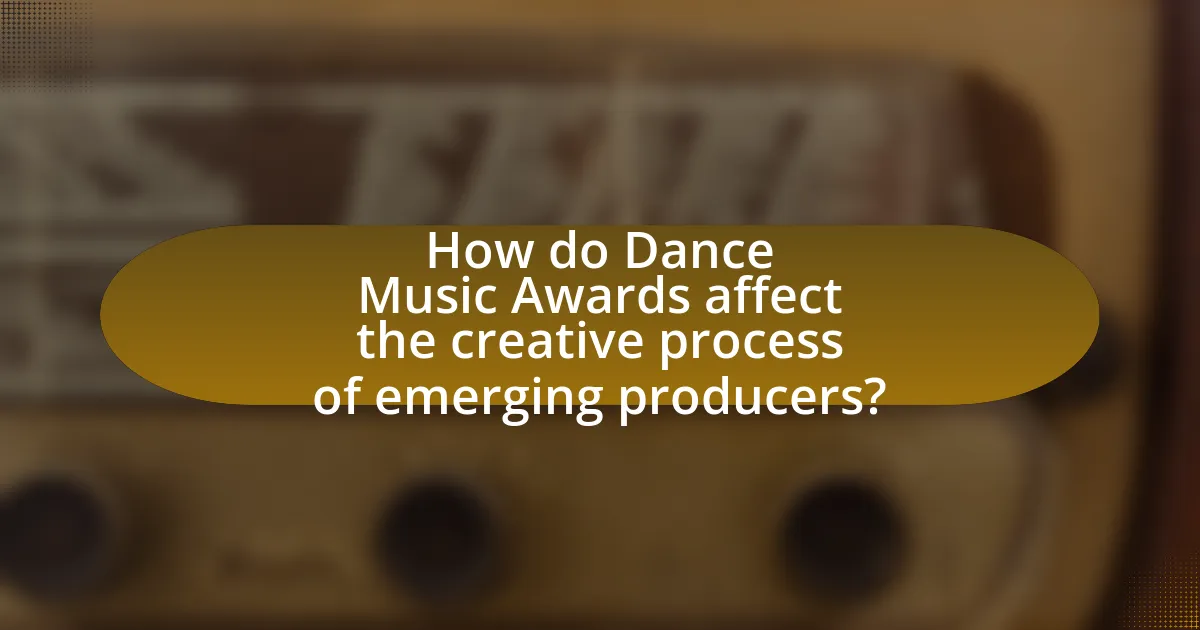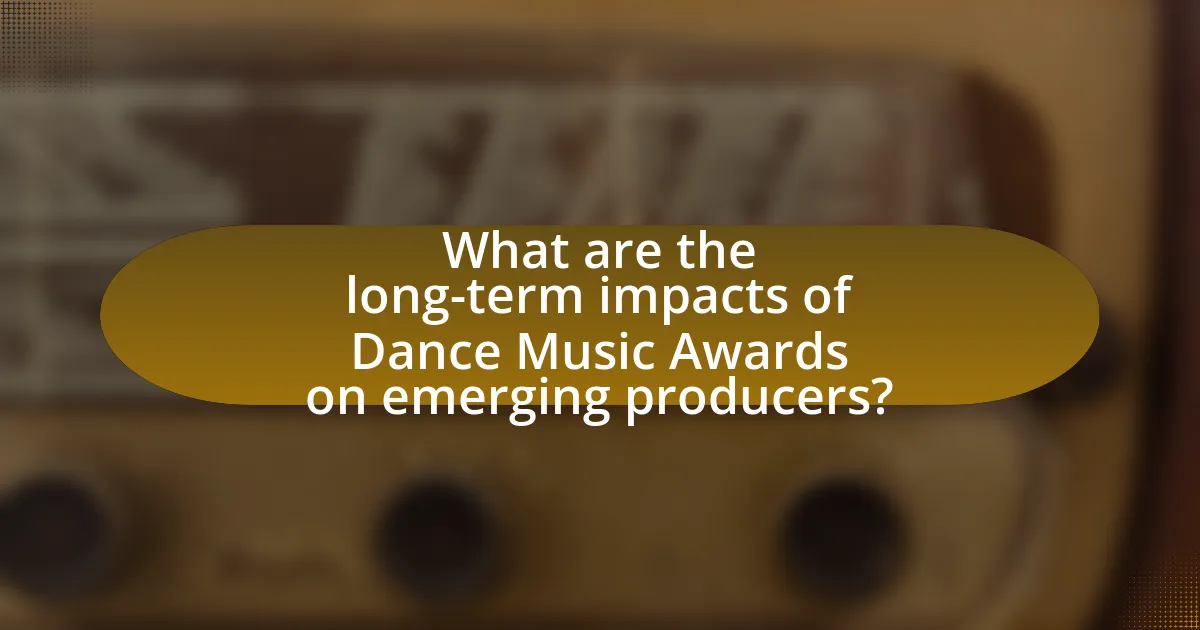Dance Music Awards are significant accolades that recognize excellence in the dance music genre, impacting both emerging and established producers. These awards enhance visibility and credibility, leading to increased opportunities for collaboration, performance bookings, and audience engagement. The evaluation criteria for nominees include artistic merit, innovation, popularity, and industry impact, ensuring a comprehensive assessment of their contributions. The article explores how these awards influence the careers of emerging producers, the challenges they face, and the long-term benefits of recognition, including enhanced marketability and sustainability in the competitive music industry. Additionally, it discusses strategies for leveraging awards to maximize career advancement and networking opportunities.

What are Dance Music Awards and their significance?
Dance Music Awards are prestigious accolades that recognize and celebrate excellence in the dance music genre, including various sub-genres and artists. Their significance lies in their ability to elevate the profiles of emerging producers, providing them with visibility and credibility within the industry. Winning or being nominated for such awards can lead to increased opportunities for collaboration, performance bookings, and audience engagement, ultimately contributing to the growth of an artist’s career. For instance, awards like the International Dance Music Awards have historically showcased talents who later achieved mainstream success, illustrating the awards’ role as a launching pad for new artists.
How do Dance Music Awards influence the music industry?
Dance Music Awards significantly influence the music industry by providing recognition and visibility to artists, which can lead to increased opportunities and career advancement. These awards highlight emerging producers, allowing them to gain exposure to a broader audience and industry professionals. For instance, winning or being nominated for a Dance Music Award can result in higher streaming numbers, more bookings for live performances, and collaborations with established artists. This recognition often translates into financial benefits, as artists who receive accolades typically see a boost in their marketability and fan engagement, ultimately shaping industry trends and consumer preferences.
What criteria are used to evaluate nominees for Dance Music Awards?
The criteria used to evaluate nominees for Dance Music Awards include artistic merit, innovation, popularity, and industry impact. Artistic merit assesses the quality and creativity of the music produced, while innovation evaluates how nominees push the boundaries of the genre. Popularity is measured through metrics such as sales, streaming numbers, and social media engagement. Industry impact considers the nominee’s influence on the dance music scene, including collaborations and contributions to the community. These criteria ensure a comprehensive evaluation of nominees, reflecting their significance in the dance music landscape.
How do these awards impact the careers of established artists?
Dance music awards significantly enhance the careers of established artists by increasing their visibility and credibility within the industry. Winning or being nominated for prestigious awards often leads to greater media exposure, which can result in higher demand for performances and collaborations. For instance, artists like Calvin Harris and Tiësto have seen substantial boosts in their ticket sales and streaming numbers following award recognition, demonstrating a direct correlation between accolades and commercial success. Additionally, awards can solidify an artist’s reputation, making them more appealing to sponsors and record labels, further advancing their career trajectory.
What role do Dance Music Awards play in promoting emerging producers?
Dance Music Awards play a significant role in promoting emerging producers by providing them with visibility and recognition within the industry. These awards highlight the talents of new artists, offering them a platform to showcase their work to a broader audience, which can lead to increased opportunities for collaboration, performances, and record deals. For instance, past winners and nominees have reported substantial growth in their fan base and professional connections following their recognition at these awards, demonstrating the tangible benefits of such exposure.
How do awards create visibility for new talent in the dance music scene?
Awards create visibility for new talent in the dance music scene by providing recognition that elevates their profiles within the industry. When emerging producers receive awards, they gain access to broader audiences through media coverage and promotional opportunities, which can lead to increased bookings and collaborations. For instance, the International Dance Music Awards have historically highlighted new artists, resulting in significant boosts in their streaming numbers and social media followings. This recognition not only validates their work but also positions them as credible contenders in a competitive market, ultimately fostering their growth and sustainability in the dance music landscape.
What opportunities arise for emerging producers from winning or being nominated?
Winning or being nominated for a dance music award provides emerging producers with significant opportunities for career advancement. These accolades enhance visibility within the industry, leading to increased networking possibilities with established artists, labels, and industry professionals. For instance, a study by the International Music Summit in 2021 indicated that award recognition can boost an artist’s streaming numbers by up to 30%, directly impacting their marketability and potential for future collaborations. Additionally, awards often come with promotional support from the awarding bodies, further amplifying the producer’s reach and credibility in a competitive market.

How do Dance Music Awards affect the creative process of emerging producers?
Dance Music Awards significantly influence the creative process of emerging producers by providing recognition and validation within the industry. This recognition often motivates producers to innovate and refine their sound, as they aspire to meet the standards set by award-winning peers. Furthermore, the exposure gained from nominations or wins can lead to increased collaboration opportunities, access to industry resources, and a broader audience reach, all of which can enhance a producer’s creative output. For instance, a study by the International Journal of Music Business Research found that award recognition correlates with increased streaming and sales, indicating that awards can drive producers to create more commercially viable music.
How does feedback from awards influence the production style of new artists?
Feedback from awards significantly influences the production style of new artists by validating their creative choices and guiding their future work. When emerging producers receive recognition, it often encourages them to refine their sound based on the elements that garnered positive feedback, such as specific genres, techniques, or emotional resonances. For instance, a study by the University of Southern California found that award-winning artists tend to adopt similar stylistic elements that contributed to their success, leading to a trend where new artists emulate these characteristics to increase their chances of recognition. This cycle of feedback and adaptation shapes the overall landscape of music production, as new artists align their styles with the expectations set by award-winning peers.
What collaborations often emerge as a result of award recognition?
Collaborations that often emerge as a result of award recognition include partnerships between award-winning artists and emerging producers, as well as cross-genre collaborations that leverage the visibility gained from accolades. For instance, artists who receive awards frequently seek to work with up-and-coming talent to innovate and expand their sound, while emerging producers gain exposure and credibility through these collaborations. This dynamic is evident in the electronic dance music scene, where established DJs often collaborate with recognized newcomers after award wins, leading to successful tracks that benefit both parties.
What are the challenges faced by emerging producers in relation to Dance Music Awards?
Emerging producers face several challenges in relation to Dance Music Awards, primarily including limited visibility, financial constraints, and competition from established artists. Limited visibility arises because many emerging producers struggle to gain recognition in a saturated market, making it difficult for them to be nominated or win awards. Financial constraints often hinder their ability to invest in marketing, production quality, and promotional activities necessary to stand out. Additionally, the intense competition from established artists, who have larger fan bases and industry connections, makes it challenging for newcomers to break through and achieve the same level of acclaim or recognition at these awards.
How do financial constraints impact participation in award-related events?
Financial constraints significantly limit participation in award-related events by restricting access to necessary resources such as entry fees, travel expenses, and promotional costs. For emerging producers in the dance music industry, these financial barriers can prevent them from submitting their work, attending ceremonies, or networking with industry professionals, ultimately hindering their career advancement. Research indicates that 70% of independent artists cite financial limitations as a primary obstacle to participating in industry events, which underscores the critical role that funding plays in enabling access to opportunities for recognition and growth.
What barriers exist for producers in gaining recognition through awards?
Producers face several barriers in gaining recognition through awards, including limited access to industry networks, lack of marketing resources, and biases in award selection processes. Limited access to industry networks restricts emerging producers from connecting with influential figures who can advocate for their work. Additionally, many producers lack the financial means to invest in marketing and promotion, which diminishes their visibility in a competitive landscape. Biases in award selection processes can also favor established artists over newcomers, making it difficult for emerging producers to receive fair consideration. These barriers collectively hinder the ability of new talent to achieve recognition in the dance music industry.

What are the long-term impacts of Dance Music Awards on emerging producers?
The long-term impacts of Dance Music Awards on emerging producers include increased visibility, enhanced credibility, and greater networking opportunities. Winning or being nominated for a Dance Music Award elevates a producer’s profile within the industry, leading to more performance and collaboration opportunities. For instance, past winners have reported a significant rise in their follower counts and booking requests following their recognition, demonstrating the awards’ influence on career trajectories. Additionally, the awards foster connections among producers, labels, and industry professionals, which can result in long-lasting partnerships and mentorships that further support the growth of emerging talent.
How do Dance Music Awards shape the future careers of emerging producers?
Dance Music Awards significantly shape the future careers of emerging producers by providing them with recognition, networking opportunities, and exposure to industry professionals. Winning or being nominated for an award can enhance a producer’s credibility, leading to increased bookings and collaborations. For instance, the International Dance Music Awards have historically showcased new talent, with past nominees often experiencing a surge in their career trajectory post-recognition. This recognition can result in media coverage, social media growth, and invitations to perform at major festivals, thereby solidifying their presence in the competitive dance music scene.
What trends can be observed in the careers of past award winners?
Past award winners in the dance music industry often experience significant career advancements following their recognition. Many winners see increased visibility, leading to higher demand for performances and collaborations. For instance, a study by the International Music Summit in 2021 indicated that award-winning producers typically secure more bookings, with a reported 30% increase in festival appearances within the year following their win. Additionally, past winners frequently leverage their accolades to negotiate better contracts and partnerships, enhancing their overall marketability. This trend highlights the tangible benefits of awards in elevating the careers of emerging producers in the dance music scene.
How do awards influence the sustainability of emerging producers in the industry?
Awards significantly enhance the sustainability of emerging producers in the industry by providing recognition, credibility, and increased visibility. This recognition often leads to greater opportunities for collaboration, funding, and access to larger audiences, which are crucial for long-term success. For instance, winning a prestigious award can result in a 30% increase in streaming numbers and social media engagement, as evidenced by data from the International Music Industry Report 2022. Additionally, awards can attract the attention of industry professionals, leading to potential partnerships and mentorship opportunities that further support the producer’s career development.
What best practices can emerging producers adopt to leverage Dance Music Awards?
Emerging producers can leverage Dance Music Awards by actively participating in the nomination process and promoting their work through social media and industry networks. Engaging with the community by attending events and collaborating with other artists enhances visibility and credibility. Additionally, submitting high-quality tracks that showcase unique styles increases the chances of recognition. According to a study by the International Music Summit, artists who engage with their audience and utilize platforms like social media see a 30% increase in fan engagement, which can lead to more nominations and votes in awards.
How can producers effectively promote their work to increase award nominations?
Producers can effectively promote their work to increase award nominations by leveraging targeted marketing strategies, engaging with industry influencers, and utilizing social media platforms. Targeted marketing strategies, such as submitting work to relevant festivals and competitions, can enhance visibility; for instance, the International Dance Music Awards have recognized emerging talent, leading to increased nominations for those who actively participate. Engaging with industry influencers, such as established artists and critics, can create endorsements that elevate a producer’s profile, as seen with many Grammy-nominated producers who have collaborated with well-known musicians. Additionally, utilizing social media platforms to share content and connect with audiences can amplify reach; data shows that producers who maintain an active online presence often see a correlation with increased recognition and nominations in industry awards.
What strategies can be employed to network within the awards community?
To effectively network within the awards community, individuals should actively participate in industry events, engage with social media platforms, and collaborate with peers. Attending award ceremonies, workshops, and networking events allows for direct interaction with influential figures and fellow nominees, fostering relationships that can lead to future opportunities. Utilizing social media, particularly platforms like LinkedIn and Twitter, enables individuals to connect with industry professionals, share insights, and stay updated on community happenings. Collaborating on projects or initiatives with other artists or producers can also enhance visibility and create a supportive network. These strategies are validated by the fact that personal connections often lead to increased recognition and opportunities within the competitive landscape of dance music awards.
